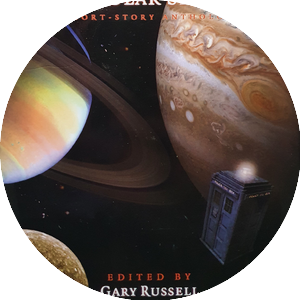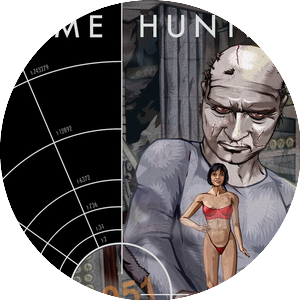Invitation
Andrew Merkelbach is an Australian Doctor Who fan and low budget film-maker. Some time in 2005, he got in touch to ask if I wanted to write a Doctor Who on a space station versus the Daleks film. To me, this immediately sounded too ambitious: even without all the usual problems and compromises involved in making a fan film, this story would need a convincing space station set and convincing Daleks. Fortunately, this was around the same time that the first series of Russell T Davies’ relaunch of Doctor Who came out, and the difficulty the BBC had getting the rights to use the Daleks were well documented: I told Andrew that as someone who had written for the BBC before, I couldn’t risk offending them by writing a script that breached their copyright and potentially damaged their reputation with the Dalek copyright holders.
Andrew mentioned that he had recently released a fan film starring a Doctor Who proxy named The Traveller, played by Andrew himself. The Curse of the Del Garia had been edited by Jon Blum, a fellow BBC Books author and somebody who I had met in person a couple of years before at the Gallifrey One convention. When I asked about Andrew, Jon said that he had a tendency to overestimate what was possible and advisable, but he could be talked round. He was also someone who would get a film finished, no matter the obstacles.
When Andrew asked instead if I’d write a follow up to his Traveller film, I said yes.
Andrew sent me a copy of The Curse of the Del Garia, and I watched it before I said yes. The story and the lead character didn’t grab me, but it did give me confidence that Jon Blum was telling the truth: if I gave a script to Andrew, I would see it on screen. Mercenary as it may sound, that was my main reason for saying yes: I had been reading about how to write for television, and the idea of having a free testing ground where I could see if I liked it and whether I could write something that would translate into images and dialogue was very tempting.
When I first started writing Doctor Who fan fiction, it gave me a safe, uncritical environment where I could make my mistakes. In writing a fan film, I hoped I could give myself that same environment for screenwriting. And there was – I have to admit – a part of me that needed the confidence boost of being brought in as the expert, the professional writer.
Inspiration
My main inspirations for Red were two images, both of which I’d used before. The first was the starting point for my Short Trips: Transmissions story Driftwood: an apparently dead body in a glass box on a beach that comes back to life. The image had been inspired by the blurb of a book that I hadn’t bought, and has stuck with me through several projects. I retooled it slightly to make it easier to film – I suggested a trench that Andrew could lie in with sand-covered planks over his top half: filming a close-up headshot would make it look like he was buried without compromising his safety.
The other image was of the trusted companion revealed as the villain of the piece. This has been done many times before, but the version of it that I was trying to recreate came from an episode of Quantum Leap where Al turned out to be the Devil in disguise. I’d started a story for Back From the Dead that cast Ace in the Al role, but it had tailed off. I thought Red would give me the chance to get the image out of my head.
The only other thing that I really wanted to do was to tightly control the setting for the story: Curse of the Del Garia had several scenes set indoors in what looked like the same few rooms in Andrew’s house, and I didn’t want to Red to have that same flat look. Instead, I set it entirely outside, on beaches and in a woods. I knew nothing about the landscape of Andrew’s home town, but thought that natural lighting and scenery would help make the story look more visually arresting.
Getting the Story
The story itself came quite easily from my initial starting points. Andrew had told me that none of the characters from The Curse of the Del Garia were available to use again, bar the Traveller, but that didn’t particularly worry me. As my main goal was to see if I could write a script that would have the right tone and voice and pace for a screenplay, I didn’t want to focus too much on the story: I kept it as simple as possible and focussed instead on the structure and the characters.
I had one eye on the practicalities of the production as I wrote: I tried to keep bespoke props and special effects completely out of the script as I went, for fear of how they might look in a low budget production. Wherever I did write an effect, I spent a long time thinking how I would film it if I was making the film, and tried as hard as I could to suggest that in the script. The only exception to that was Andrew’s insistence that he could do a good “glowing ball” effect for the monster: I was cautious, but wrote it in as briefly as I could just in case.
The script itself was written quite quickly and then sent over to Andrew for his thoughts. He didn’t have many changes to suggest, so I left it to him and waited to hear how he was getting on.
What Happened Next?
It took a while for Andrew to get everything in place for filming, but that was only to be expected: he was working completely off his own back, with no support or funding after all. But he managed to pull together a cast of actors who knew what they were doing, and scene by scene he got the footage he wanted. Sadly for me, the main casualty from the script was the opening image I’d fallen in love with: Andrew had been uneasy about my suggestion for filming himself apparently buried in the sand, and so instead filmed the Traveller waking up face down in the sand instead.
The only worry we had was nothing to do with the production, but a symptom of Andrew’s enthusiasm. He had been quite clear with everybody that what he was doing was making a real film, just one with a low budget. He wasn’t keen on anyone referring to Del Garia or Red as fan films, and despite my own views I did my best to accommodate him. However, when it was announced that Christopher Eccleston was leaving Doctor Who, Andrew had the idea to put out a press release touting himself as a possible replacement. At that point, Jon Blum was still involved in the project, acting as film editor as he had for Del Garia. It took the combined efforts of myself and Jon to dissuade Andrew from his plan, on the basis that it would make him – and by extension, his film – look less than professional.
Then – a good while later, as I believe the editing process had not been easy – I got a copy of Red through the post. A little nervously, I watched it. It was exactly what I hoped it would be: a solid fan film, nothing that would set the world on fire but enough to give me confidence that I could write for the screen.
Andrew was even more enthusiastic, and had plans to use it as a stepping stone upwards in his filmmaking career. His first plan was to make a sequel to Red: one of the actors had said they’d be happy to come back, and in a flush of enthusiasm I said I would write the script. The only stipulation was that it should involve zombies: Andrew said he had some “very convincing” zombie masks he wanted to use. I wrote a script based on a stage play I had written as part of my Drama degree, about a man dying of cancer who agrees to trade lives with an immortal corpse in the desert. Andrew was enthusiastic, but over time that waned. I think he genuinely wanted to leave the Traveller behind and do something he thought might have more commercial possibilities: he said he was planning to do a zombie film instead. He didn’t ask me to write it, and I didn’t offer: I’d enjoyed writing Red and had got out of it exactly what I hoped for, but we both knew that I wasn’t going to spend the rest of my career writing for Andrew.
Andrew has dropped in and out of Doctor Who fandom over the years, and Red has been politely ignored by all but a handful of his friends and acquaintances. But in terms of why I did it and what I got out of it, I still consider it was of the more successful things I’ve worked on.


